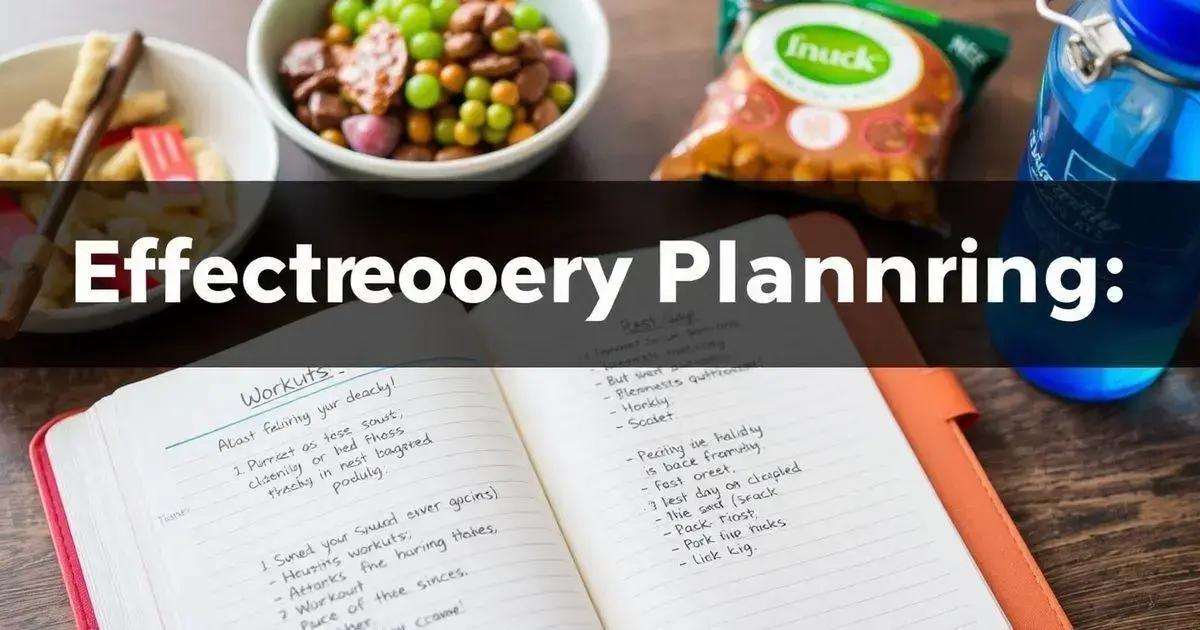The importance of rest and recovery days in fitness plans cannot be overstated, as they promote muscle repair, prevent injuries, and enhance mental health, ensuring improved performance and sustained motivation in your fitness journey.
When it comes to fitness plans, many people often underestimate the importance of rest and recovery days. These days are not just free passes to skip workouts; they play a critical role in your overall success and health. Not only do rest days allow your muscles to recover and grow, but they also help prevent fatigue and injuries. In this article, we will delve into the significance of incorporating recovery into your fitness routine, discussing both physical and mental health benefits.
Understanding the Role of Rest in Fitness

Understanding the role of rest in fitness is essential for anyone embarking on a fitness journey. Many people think that working out hard every day leads to the best results. However, this belief can lead to fatigue and injuries. Rest days are just as important as workout days because they allow your body to recover and repair.
During exercise, small tears occur in your muscles. These tears are a normal part of the muscle-building process but need time to heal. Rest allows your muscles to recover, grow stronger, and prepare for the next workout session. Without adequate rest, your body may not perform at its best, and you can experience diminishing returns from your hard work.
Rest days give your joints and tissues a chance to rejuvenate, further enhancing your performance when you get back to the gym. Recovery is a process that involves not only your muscles but also your ligaments and tendons, which are crucial for overall strength and stability.
Additionally, rest aids in energy restoration. A rigorous workout depletes your energy stores, which are critical for your next training session. Taking time off allows your body to replenish these levels.
Incorporating rest into your fitness plan is not just about avoiding exhaustion; it’s about improving your overall fitness and enjoyment of your workouts. Remember that consistency combined with adequate recovery is the key to achieving your fitness goals.
Physical Benefits of Recovery Days

Recovery days play a vital role in enhancing physical health and performance. When you rest properly, several important benefits occur that directly impact your fitness progress. One major benefit is muscle repair and growth. During intense workouts, small muscle fibers get damaged. Recovery gives your body the time it needs to repair these fibers, allowing them to grow stronger and bigger.
Another significant advantage is reduced risk of injury. Without proper recovery, your muscles, ligaments, and tendons can become overly fatigued. This excessive fatigue can lead to strains or sprains. By incorporating recovery days into your routine, you can help maintain your body’s overall health and prevent long-term injuries.
Improved performance is also a direct result of recovery. When your body is well-rested, you can perform better in your next workout. You’ll have more strength, better endurance, and improved flexibility. This can lead to greater achievements in your fitness goals, from lifting heavier weights to running longer distances.
Additionally, recovery is essential for reducing muscle soreness. After a hard workout, you might feel sore the next day. This is called delayed onset muscle soreness (DOMS). Taking time to rest helps alleviate this discomfort and prepares your body for the next session.
Finally, recovery can also enhance overall energy levels. With rest, you recharge your energy stores, making your next workout session more effective and enjoyable. This creates a cycle of improvement that benefits your overall fitness journey.
How to Plan Effective Recovery Days

Planning effective recovery days is crucial for your fitness journey. Here are some tips to help you create the best recovery plan.
First, schedule your recovery days in advance. Just like your workouts, rest days should be part of your fitness routine. This ensures that you don’t overlook the need for recovery while focusing on your training.
Second, listen to your body. Pay attention to signs of fatigue or soreness. If you feel excessively tired or have nagging pains, take an extra day off or modify your activities. Recovery needs can vary day to day.
Third, engage in active recovery. Instead of complete rest, consider light activities like walking, yoga, or swimming. These movements can help keep blood flowing to your muscles without straining them.
Fourth, focus on hydration and nutrition. Drinking plenty of water and consuming an appropriate diet rich in protein, healthy fats, and carbohydrates supports recovery. Foods like chicken, fish, nuts, and whole grains can help repair muscles and restore energy levels.
Finally, remember to incorporate rest into your sleep schedule. Quality sleep is essential for muscle recovery and overall health. Aim for 7-9 hours of restful sleep each night.
By carefully planning your recovery days, you will promote better performance and reduce the risk of injuries, keeping you on track with your fitness goals.
Mental Health and Recovery in Fitness

Mental health is an essential aspect of overall well-being, and recovery days in fitness play a significant role in maintaining it. When you push your body too hard without taking breaks, it can lead to both physical and mental burnout. This burnout can affect your motivation, mood, and enjoyment of your workouts.
Taking recovery days allows your mind to rest and reset. It provides an opportunity to step back and assess your goals and progress. During this time, focusing on mindfulness and relaxation can help reduce stress and anxiety. Activities like meditation, gentle yoga, or spending time in nature can significantly benefit your mental state.
Increased creativity is another mental health benefit of taking breaks. When you give yourself time to relax and clear your mind, you may find new ideas and solutions to problems. This can also lead to enhanced motivation, making your return to workouts more enjoyable and productive.
Moreover, recovery days create space for connecting with friends and family, fostering social interactions that are important for mental health. Engaging in light activities with loved ones can enhance your emotional support and keep you motivated on your fitness journey.
Finally, taking time off from workouts allows your brain to recharge, leading to improved focus and concentration during training sessions. When your mind is fresh, you will find it easier to concentrate on your tasks and achieve better results.
The Importance of Incorporating Recovery in Fitness Plans
In summary, taking rest and recovery days is crucial for a balanced fitness journey. These days allow your body to repair and strengthen muscles, prevent injuries, and enhance overall performance.
Moreover, recovery is essential for mental health. It helps reduce stress, boosts creativity, and allows for better focus during workouts. By understanding how to plan effective recovery days, you can ensure that your fitness routine supports both physical and mental well-being.
Remember, a successful fitness plan is not just about hard workouts; it’s also about giving your body and mind the time they need to recover and thrive. Embrace rest as part of your fitness journey and enjoy the transformation it brings.
FAQ – Frequently Asked Questions about the Importance of Rest and Recovery Days in Fitness Plans
Why are recovery days important in a fitness plan?
Recovery days are crucial as they allow your muscles to repair, prevent injuries, and help maintain mental health and motivation.
What activities can I do on recovery days?
Active recovery activities include light walking, yoga, swimming, or any gentle exercise that keeps you moving without overexerting yourself.
How many recovery days should I take each week?
Most people benefit from at least one to two recovery days each week, depending on the intensity of their workouts and individual needs.
How does rest improve mental health?
Rest promotes mental recharge, reduces stress, and can enhance creativity and focus, making it easier to stay motivated and productive.
Can I still do something on my rest days?
Yes, you can engage in light activities or hobbies that you enjoy; the goal is to allow your body to recover while still keeping a routine.
What are signs that I need more recovery?
Signs include persistent soreness, fatigue, lack of motivation, and decreased performance. If you experience these, consider adding more recovery days.













